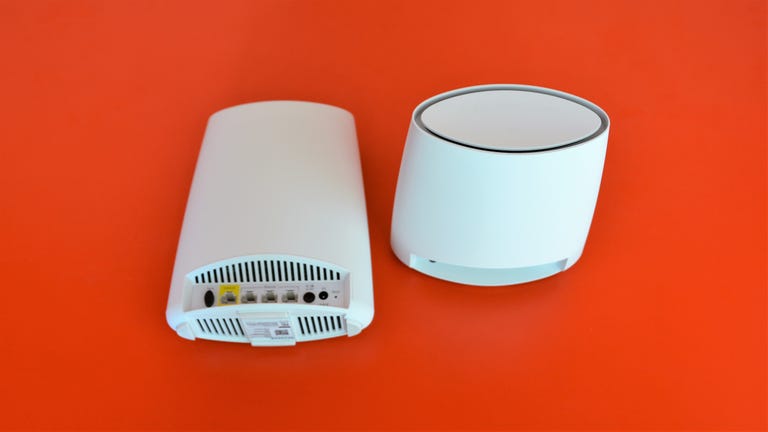 Why You Can Trust CNET
Why You Can Trust CNET Netgear Orbi RBK40 Tri-band WiFi System review: A midtier Wi-Fi system for large homes
Netgear's new Orbi RBK40 strikes a balance between cost and performance. Here's CNET's full review.
The Orbi RBK40 Wi-Fi system is the stripped down and more affordable version of the original Orbi RBK50 that came out last year. Its dedicated backhaul Wi-Fi band -- one that wirelessly links its two hardware units together -- has just half the speed of its older brother's.
The Good
The Bad
The Bottom Line
This means the new system has slower Wi-Fi speed compared to the previous model or less coverage, depending on how you want to use it. However, since the RBK50 can be overkill for many homes, the new system actually strikes a balance for those living in a home of 4000 square feet or less, wanting to bring fast broadband speed to every corner.
The RBK40 costs $350 (AU$599, £300) for a set of two units, $50 cheaper than the original Orbi, but more expensive than the similarly-configured Linksys Velop which goes for $300 for two units. Thanks to the its full feature set -- which the Velop sorely lacks - the RBK40 can still be a slightly better choice for those with a fast broadband connection.
But if you just need to share a moderate internet connection -- one that has slower than 100 megabits per second download speed -- you might want to consider a more affordable home mesh system among these instead.
The RBK40 (front) is very similar to the RBK50 but come with slightly more compact hardware units.
Stripped-down dedicated backhaul band
Like all Orbi Wi-Fi systems, the RBK40 includes two hardware units. One of them is a router (model RBR40) that you connect to your broadband modem. The other is a satellite unit (model RBS40) to be placed some 40 feet away to wirelessly extend the Wi-Fi coverage. They're also all tri-band systems, meaning they have two 5GHz bands and one 2.4Ghz band.
When released last year, the original Orbi (model RBK50) was the very first home mesh system on the market that dedicated one of its 5GHz Wi-Fi bands for backhaul. This was revolutionary at the time because it eliminates the 50 percent signal loss that always occurs with wireless extenders when a band has to both receive and re-broadcast a signal at the same time.
Better yet, the RBK50's uses a 4x4 band for backhaul that has a top speed of up to 1733Mbps, while having two 2x2 bands -- capping at 867Mbps on 5GHz and 400Mbps on 2.4GHz -- for fronthaul, which is the Wi-Fi network for devices to connect to. This means even when you place the satellite unit very far from the router unit, causing the backhaul link to degrade a great deal, it's still fast enough to to deliver the fronthaul speed in full. This configuration effectively makes the RBK50 the only Wi-Fi systems that deliver consistent Wi-Fi speed similar to that of a standalone 2x2 router, no matter where you are within its coverage.
Since most homes use Wi-Fi only to share internet and most residential broadband connections are much slower than 400Mbps, the RBK50's performance can be overkill. This is the reason Netgear released the RBK40 and the RBK30, of which the backhaul band's speed is cut in half. This means devices connected to its satellite unit will likely have slower Wi-Fi speed compared to those connected the main router unit.
Netgear's Orbi Wi-Fi system family
| Dedicated back-haul speed | 5GHz ceiling speed | 2.4GHz ceiling speed | Wi-Fi standard | Wi-Fi coverage | U.S. price | |
| Original Orbi (RBK50) | 1,733Mbps | 867 | 400Mbps | AC3000 | 5,000 sq ft | $400 |
| Orbi RBK40 | 867Mbps | 867 | 400Mbps | AC2200 | 4,000 sq ft | $350 |
| Orbi RBK30 | 867Mbps | 867 | 400Mbps | AC2200 | 3,500 sq ft | $300 |
Easy setup, full feature, sluggish web interface
Setting up the RBK40 is basically the same as that of the RBK50 since the two share the exact same process. You can either use the web interface or the Netgear Orbi mobile app, and both have a setup wizard that walks you through a few short steps. I took me just about 15 minutes to get the system up and running, including unboxing it.
Note that by default you don't need to register an account with Netgear nor does the system stay connected to Netgear. However, if you want to easily manage your home network even when you're out and about, you can opt for an optional Netgear account and use a different app called Netgear Genie. In this case, the system connects to Netgear at all time. Netgear says it's in the process of consolidating the apps but for now you'll need use multiple apps with the system. If you're comfortable with its web interface though, you can skip the apps completely.
The system's web interface is the same as that of most Netgear routers and offers the same set of features and settings. This means if you want to deep customize your home network -- something not possible with most other Wi-Fi systems -- you can with the Orbi. However, the Orbi doesn't have a built-in protection feature against online threats which is an increasingly popular feature that other systems, like the Amped Wireless Ally or the TP-Link Deco M5, have incorporated.
Also, the system's web interface is far from perfect, taking a long time - tens of seconds -- to transition from one section to another. Though this doesn't affect the initial setup process, it can be a pain if you want to change a lot of settings and features. Netgear told me it would improve this in the near future via firmware updates.
Excellent performance
As expected, the RBK40's performance wasn't as fast as that of the RBK50 but it was excellent nonetheless. In testing, I could get a sustained Wi-FI speed of up to more than 410Mbps when connected directly to the router unit and up to some 290Mbps when connected to the satellite unit, which was placed 45 feet away. This means the system indeed doesn't have signal loss, just some signal degradation caused by the the distance between the two units.
CNET Labs' Wi-Fi system performance.
- Close range
- Long range
In term of coverage, the system could easily cover some 4000 square feet with a sustained Wi-Fi speed of more than 100Mbps. You can always increase the distance between the two units to have a larger coverage but then the Wi-Fi speed will be reduced. Keep in mind that I tested the system in an environment with a lot of other Wi-Fi networks which adversely affected the Orbi's performance. Generally with Wi-Fi, your mileage varies depending on where you are.
If you have a very large home, you can also spend another $200 for second satellite unit, which by the way will work with all existing Orbi systems.
Should I buy it?
If you have fast a fast internet connection at home, the Orbi RBK40 is a great buy though you can also consider the Linksys Velop which is slightly slower and has less features but costs $50 less for a set of two unit. If you want a built-in protection against online threats, also consider the Amped Wireless Ally.
On the other hand, if you just want to share a basic broadband connection, the Google Wifi or the TP-Link Deco M5 is a better deal. As of now, you can't connect Netgear Orbi hardware units together using network cables -- though Netgear says that might change soon. This means if your home is wired for Ethernet, other systems without a dedicated backhaul bandwidth but support using network cable for backhaul, like the Google Wifi or the Eero, is a better fit.



